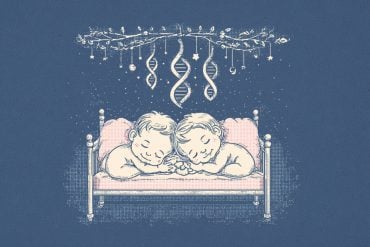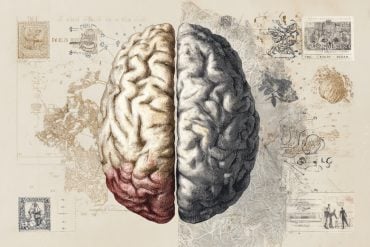Summary: Following a night of sleep deprivations, levels of tau in the blood increase 17% in healthy young men.
Source: Uppsala University
A preliminary study by researchers at Uppsala University has found that when young, healthy men were deprived of just one night of sleep, they had higher levels of tau – a biomarker for Alzheimer’s disease – in their blood than when they had a full, uninterrupted night of rest. The study is published in the medical journal Neurology.
Tau is a protein found in neurons and the protein can form into tangles. These accumulate in the brains of people with Alzheimer’s disease. This accumulation can start decades before symptoms of the disease appear. Previous studies of older adults have suggested that sleep deprivation can increase the level of tau in the cerebral spinal fluid. Trauma to the head can also increase circulating concentrations of tau in blood.
“Many of us experience sleep deprivation at some point in our lives due to jet lag, pulling an all-nighter to complete a project, or because of shift work, working overnights or inconsistent hours,” said study author Jonathan Cedernaes, MD, PhD, from Uppsala University in Sweden. “Our exploratory study shows that even in young, healthy individuals, missing one night of sleep results in a slight increase in the level of tau in blood. This suggests that over time, similar types of sleep disruption could potentially have detrimental effects.”
The study involved 15 healthy, normal-weight men with an average age of 22. They all reported regularly getting seven to nine hours of quality sleep per night.
There were two phases to the study. For each phase, the men were observed under a strict meal and activity schedule in a sleep clinic for two days and nights. Blood samples were taken in the evening and again in the morning. For one phase, participants were allowed to get a good night of sleep both nights. For the other phase, participants were allowed to get a good night of sleep the first night followed by a second night of sleep deprivation. During sleep deprivation, lights were kept on while participants sat up in bed playing games, watching movies or talking.

Researchers found that the men had an average 17-percent increase in tau levels in their blood after a night of sleep deprivation compared to an average 2-percent increase in tau levels after a good night of sleep.
Researchers also looked at four other biomarkers associated with Alzheimer’s but there were no changes in levels between a good night of sleep and one night of no sleep.
“It’s important to note that while accumulation of tau in the brain is not good, in the context of sleep loss, we do not know what higher levels of tau in blood represent” said Cedernaes. “When neurons are active, release of tau in the brain is increased. Higher levels in the blood may reflect that these tau proteins are being cleared from the brain or they may reflect an overall elevation of the concentration of tau levels in the brain. Future studies are needed to investigate this further, as well as to determine how long these changes in tau last, and to determine whether changes in tau in blood reflects a mechanism by which recurrent exposure to restricted, disrupted or irregular sleep may increase the risk of dementia. Such studies could provide key insight into whether interventions targeting sleep should begin at an early age to reduce a person’s risk of developing dementia or Alzheimer’s disease.”
The main limitation of the study was its small size. In addition, it looked only at healthy young men, so the results may not be the same for women or older people.
Source:
Uppsala University
Media Contacts:
Jonathan Cedernaes – Uppsala University
Image Source:
The image is in the public domain.
Original Research: Closed access
“Effects of acute sleep loss on diurnal plasma dynamics of CNS health biomarkers in young men”. Christian Benedict, Kaj Blennow, Henrik Zetterberg, Jonathan Cedernaes.
Neurology doi:10.1212/WNL.0000000000008866.
Abstract
Effects of acute sleep loss on diurnal plasma dynamics of CNS health biomarkers in young men
Objective
Disrupted sleep increases CSF levels of tau and β-amyloid (Aβ) and is associated with an increased risk of Alzheimer disease (AD). Our aim was to determine whether acute sleep loss alters diurnal profiles of plasma-based AD-associated biomarkers.
Methods
In a 2-condition crossover study, 15 healthy young men participated in 2 standardized sedentary in-laboratory conditions in randomized order: normal sleep vs overnight sleep loss. Plasma levels of total tau (t-tau), Aβ40, Aβ42, neurofilament light chain (NfL), and glial fibrillary acidic protein (GFAP) were assessed using ultrasensitive single molecule array assays or ELISAs, in the fasted state in the evening prior to, and in the morning after, each intervention.
Results
In response to sleep loss (+17.2%), compared with normal sleep (+1.8%), the evening to morning ratio was increased for t-tau (p = 0.035). No changes between the sleep conditions were seen for levels of Aβ40, Aβ42, NfL, or GFAP (all p > 0.10). The AD risk genotype rs4420638 did not significantly interact with sleep loss–related diurnal changes in plasma levels of Aβ40 or Aβ42 (p > 0.10). Plasma levels of Aβ42 (−17.1%) and GFAP (−12.1%) exhibited an evening to morning decrease across conditions (p < 0.05).
Conclusions
Our exploratory study suggests that acute sleep loss results in increased blood levels of t-tau. These changes provide further evidence that sleep loss may have detrimental effects on brain health even in younger individuals. Larger cohorts are warranted to delineate sleep vs circadian mechanisms, implications for long-term recurrent conditions (e.g., in shift workers), as well as interactions with other lifestyle and genetic factors.






